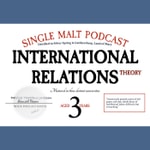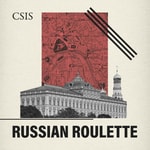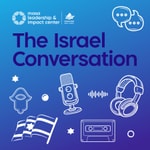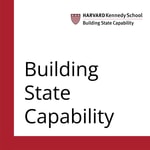The International Security Podcast – Détails, épisodes et analyse
Détails du podcast
Informations techniques et générales issues du flux RSS du podcast.
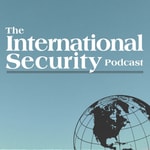
The International Security Podcast
International Security
Fréquence : 1 épisode/90j. Total Éps: 24

Classements récents
Dernières positions dans les classements Apple Podcasts et Spotify.
Apple Podcasts
🇫🇷 France - socialSciences
30/07/2025#99🇫🇷 France - socialSciences
29/07/2025#89🇫🇷 France - socialSciences
28/07/2025#80🇫🇷 France - socialSciences
27/07/2025#69🇫🇷 France - socialSciences
26/07/2025#61🇫🇷 France - socialSciences
25/07/2025#45🇫🇷 France - socialSciences
24/07/2025#94🇫🇷 France - socialSciences
23/07/2025#85🇫🇷 France - socialSciences
22/07/2025#74🇫🇷 France - socialSciences
21/07/2025#56
Spotify
Aucun classement récent disponible
Liens partagés entre épisodes et podcasts
Liens présents dans les descriptions d'épisodes et autres podcasts les utilisant également.
See allQualité et score du flux RSS
Évaluation technique de la qualité et de la structure du flux RSS.
See allScore global : 58%
Historique des publications
Répartition mensuelle des publications d'épisodes au fil des années.
2 - Clerics, Monarchs, and the Ethnoreligious Cleansing of Western Europe
Saison 2 · Épisode 2
mardi 18 juin 2024 • Durée 24:08
Guests:
Şener Aktürk is Professor of International Relations at Koç University in Istanbul, Türkiye.
International Security Article: Şener Aktürk, “Not So Innocent: Clerics, Monarchs, and the Ethnoreligious Cleansing of Western Europe,” International Security, Vol. 48, No. 4 (Spring 2024), pp. 87–136.
Originally released on June 18, 2024.
1 - A ‘Nuclear Umbrella’ for Ukraine?
Saison 2 · Épisode 1
mercredi 20 mars 2024 • Durée 21:27
Guest:
Matthew Evangelista is President White Professor of History and Political Science at Cornell University.
International Security Article:
This podcast is based on Matthew Evangelista, “A ‘Nuclear Umbrella’
for Ukraine? Precedents and Possibilities for Postwar European Security,” International Security, Vol. 48, No. 3 (Winter 2023/24), pp. 7–50, https://doi.org/10.1162/isec_a_00476.
Originally released on March 20, 2024.
09-U.S. Electoral Constraints, Military Strategy, and the Iraq War
Saison 1 · Épisode 9
jeudi 18 juin 2020 • Durée 40:48
Guests
Andrew Payne is the Hedley Bull Research Fellow in International Relations at the University of Oxford.
Emma Sky is the director of the Yale World Fellows Program and a Senior Fellow at Yale University's Jackson Institute for Global Affairs. Sky served as the Governate Coordinator of Kirkuk for the Coalition Provisional Authority from 2003 to 2004, as well as an advisor to the Commanding General of U.S. forces in Iraq from 2007 to 2010.
International Security Article
This podcast is based on Andrew Payne, “Presidents, Politics, and Military Strategy: Electoral Constraints during the Iraq War,” International Security, Vol. 44, No. 3 (Winter 2019/2020), pp. 163–203.
Additional Related Readings:
David D. Kirkpatrick and Adam Nagourney, “In an Election Year, a Shift in Public Opinion on the War,” New York Times, March 27, 2006.
Peyton M. Craighill, “Public Opinion Is Settled as Iraq War Concludes,” Washington Post, November 6, 2011.
Emma Sky, “The Death of the U.S.-Iraqi Relationship,” Foreign Affairs, January 3, 2020.
Lauren Gambino, “Iran Crisis Pushes Foreign Policy to the Fore in Democratic Primary,” Guardian, January 9, 2020.
Andrew Payne, “Trump Just De-escalated in the Middle East. Here’s Why We Shouldn’t Be Surprised,” Washington Post, January 11, 2020.
Thomas Gibbons-Neff and Julian E. Barnes, “Trump Wants Troops in Afghanistan Home by Election Day. The Pentagon Is Drawing Up Plans,” New York Times, May 26, 2020.
08-Chinese Views on Nuclear Escalation
Saison 1 · Épisode 8
mercredi 15 avril 2020 • Durée 44:16
Guests:
Fiona Cunningham is an Assistant Professor of Political Science and International Affairs at the George Washington University.
Admiral Cecil Haney (ret.) previously served as the Commander of the U.S. Strategic Command, as well as Commander of the U.S. Pacific Fleet. Admiral Haney is currently on the Center for a New American Security Board of Directors.
International Security Article:
This podcast is based on Fiona S. Cunningham and M. Taylor Fravel, “Dangerous Confidence? Chinese Views on Nuclear Escalation,” International Security, Vol. 44, No. 2 (Fall 2019), pp. 61-109.
Additional Related Readings:
Caitlin Talmadge, The US-China Nuclear Relationship: Why Competition Is Likely to Intensify (Washington, D.C.: Brookings Institution Press, 2019).
“Warheads Up: China’s Nuclear Arsenal Was Strikingly Modest, But That Is Changing,” Economist, November 21, 2019.
Eric Heginbotham et al., China’s Evolving Nuclear Deterrent: Main Drivers and Issues for the United States (Santa Monica, Calif.: RAND Corporation, 2017).
M. Taylor Fravel, "China's 'World-Class Military' Ambitions: Origins and Implications," Washington Quarterly, Vol. 43, Issue 1 (2020), pp. 85-99.
07-The Post-Conflict Politics of Migration and Refugee Return
Saison 1 · Épisode 7
mercredi 8 avril 2020 • Durée 42:08
Guests:
Stephanie Schwartz is an Assistant Professor of International Relations at the University of Southern California.
Anne C. Richard served as the Assistant Secretary of State for Population, Refugees, and Migration in the Obama Administration (2012-2017). She is currently an Adjunct Professor at the Walsh School of Foreign Service’s Institute for the Study of International Migration at Georgetown University.
International Security Article:
This podcast is based on Stephanie Schwartz, “Home, Again: Refugee Return and Post-Conflict Violence in Burundi,” International Security, Vol. 44, No. 2 (Fall 2019), pp. 110-145.
Additional Related Reading:
Stephanie Schwartz, “Sending Refugees Back Makes the World More Dangerous,” Foreign Policy, November 27, 2019.
Anne C. Richard, “US Diplomacy on Refugees and Migrants: Inside Recent History,” Georgetown Journal of International Affairs, Vol. 20 (Fall 2019), pp. 42-50.
Megan Bradley, “Rethinking Return: Defining Success in Refugee Repatriation,” World Politics Review, December 3, 2013.
Kevin Sieff, “‘What Other Choice Do I have?’: How Debt-Ridden Refugees Are Being Forced to Return to a War Zone,” Washington Post, December 15, 2017.
Kathleen Newland and Brian Salant, “Increased Focus on Forced Return of Migrants and Asylum Seekers Puts Many in Peril,” Migration Policy Institute, December 12, 2017.
“Tanzania: Burundians Pressured into Leaving,” Human Rights Watch, December 12, 2019.
Louisa Loveluck, “Assad Urged Syrian Refugees to Come Home. Many Are Being Welcomed with Arrest and Interrogation,” Washington Post, June 2, 2019.
06-Deterring Wartime Atrocities and the Yugoslav Tribunal
Saison 1 · Épisode 6
mercredi 1 avril 2020 • Durée 44:02
Guests:
Jacqueline R. McAllister is an Assistant Professor of Political Science at Kenyon College.
Wesley K. Clark is a retired four-star general in the U.S. Army and was the Supreme Allied Commander Europe of NATO during the Kosovo War. He is currently a Senior Fellow at UCLA’s Burkle Center.
International Security Article:
This episode is based on Jacqueline R. McAllister, “Deterring Wartime Atrocities: Hard Lessons from the Yugoslav Tribunal,” International Security, Vol. 44, No. 3 (Winter 2019/20), pp. 84-128.
Additional Related Readings:
Wesley K. Clark, “John Bolton is dead wrong. The U.S. has every reason to cooperate with the International Criminal Court,” Washington Post, September 21, 2018.
Dan Sabbagh, “‘Still Needed’: NATO Marks 20 Years in Kosovo,” Guardian, June 12, 2019.
Jacqueline R. McAllister, “Bending the Arc: How to Achieve Justice at the International Criminal Court,” Foreign Affairs, August 3, 2015.
Eric Stover, Victor Peskin, and Alexa Koenig, “Radovan Karadzic and the (Very) Long Arc of Justice,” Foreign Policy, March 24, 2016.
Marlise Simmons, “Yugoslavia Tribunal Leave Rich Legacy, but ‘Immense’ Challenges Remain,” New York Times, December 23, 2017.
Jacqueline R. McAllister, “The Extraordinary Gamble: How The Yugoslav Tribunal’s Indictment Of Slobodan Milosevic During The Kosovo War Affected Peace Efforts,” Brown Journal of World Affairs, Fall/Winter 2019, 26(1): 201-213.
Hayley Evans and Paras Shah, “ICC Appeals Chamber Authorizes Investigation Into Crimes in Afghanistan,” Lawfare, March 13, 2020.
05-Domestic Politics, Nuclear Choices, and the Iran Deal
Saison 1 · Épisode 5
jeudi 13 février 2020 • Durée 40:29
Guests:
Elizabeth Saunders is an Associate Professor at Georgetown University’s Edmund A. Walsh School of Foreign Service and a faculty member in the Security Studies Program. She is also a Non-Resident Senior Fellow at the Project on International Order and Strategy at the Brookings Institution.
Suzanne Maloney is the Interim Vice President and Director of the Foreign Policy program at the Brookings Institution, where she focuses on the politics of Iran and the Persian Gulf.
International Security Article:
This episode is based on Elizabeth N. Saunders, “The Domestic Politics of Nuclear Choices — A Review Essay,” International Security, Vol. 44, No. 2 (Fall 2019), pp. 146–184.
Additional Related Readings:
- David Sanger, “A mericans and Iranians See Constraints at Home in Nuclear Negotiations,”New York Times, July 13, 2014.
- Anthony Cordesman, “The Iran Nuclear Deal and the Threat from American Domestic Politics,” Center for Strategic and International Studies, September 10, 2015.
- Ariane Tabatabai, “How Iran Will Determine the Nuclear Deal’s Fate,” Foreign Affairs, May 16, 2018.
- Suzanne Maloney, “Trump Wants a Bigger, Better Deal with Tehran. What Does Tehran Want?,”Brookings Institution, August 8, 2018.
- Nahal Toosi, “Democrats Want to Rejoin the Iran Nuclear Deal. It’s Not That Simple,” Politico, July 20, 2019.
- Patrick Wintour,“Purge of Reformists in Iran Election Could Doom Nuclear Deal, Say Diplomats,” The Guardian, February 9, 2020.
Originally released on February 13, 2020
04-How to Enlarge NATO
Saison 1 · Épisode 4
mercredi 15 janvier 2020 • Durée 50:10
Guests:
Mary Elise Sarotte is the Marie-Josée and Henry R. Kravis Distinguished Professor of Historical Studies at the School of Advanced International Studies at Johns Hopkins University.
Douglas Lute is a Non-Resident Senior Fellow at the Project on Europe and the Transatlantic Relationship at the Harvard Kennedy School’s Belfer Center. Ambassador Lute is also the former U.S. Permanent Representative to NATO from 2013 to 2017, as well as a career Army officer who retired from active duty in 2010 as a lieutenant general after 35 years of service.
International Security Article:
This episode is based on M.E. Sarotte, “How to Enlarge NATO: The Debate inside the Clinton Administration, 1993-95,” International Security, Vol. 44, No. 1 (Summer 2019), pp. 7–41.
Additional Related Readings:
- Nicholas Burns and Douglas Lute, “NATO at Seventy: An Alliance in Crisis,” Belfer Center Project on Europe and the Transatlantic Relations Report, February 2019.
- Serhii Plokhy and M.E. Sarotte, “The Shoals of Ukraine: Where American Illusions and Great-Power Politics Collide,” Foreign Affairs, January/February 2020.
- Mary Elise Sarotte, “A Broken Promise?What the West Really Told Moscow About NATO Expansion,” Foreign Affairs, September/October 2014.
- John J. Mearsheimer, “Why the Ukraine Crisis is the West’s Fault,” Foreign Affairs, September/October 2014.
- Michael McFaul; Stephen Sestanovich; John J. Mearsheimer, “Faulty Powers: Who Started the Ukraine Crisis?” Foreign Affairs, November/December 2014.
- James Goldgeier, “Promises Made, Promises Broken? What Yeltsin Was Told About NATO in 1993 and Why It Matters,” War on the Rocks, July 12, 2016.
Originally released on January 15, 2020
03-Debating ‘The End of War’
Saison 1 · Épisode 3
vendredi 20 décembre 2019 • Durée 42:22
Guests:
Michael Mousseau is a professor in the School of Politics, Security, and International Affairs at the University of Central Florida.
Graham Allison is the Douglas Dillon Professor of Government at Harvard University, and former Dean of the Harvard Kennedy School.
International Security Article:
This episode is based on Michael Mousseau, “The End of War: How a Robust Marketplace and Liberal Hegemony Are Leading to Perpetual World Peace,” International Security, Vol. 44, No. 1 (Summer 2019), pp. 160–196.
Additional Related Readings:
- Tanisha M. Fazal and Paul Poast, “War Is Not Over: What the Optimists Get Wrong About Conflict,” Foreign Affairs, November/December 2019.
- Graham Allison, “The Thucydides Trap: Are the U.S. and China Headed for War?” Atlantic, September 24, 2015.
Originally aired on December 20, 2019
02-Chinese Coercion in the South China Sea
Saison 1 · Épisode 2
jeudi 14 novembre 2019 • Durée 47:18
Guests:
Ketian Zhang is an Assistant Professor of International Security in the Schar School of Policy and Government at George Mason University.
Scott Swift is a retired admiral with nearly 40 years of experience in the U.S. Navy. Swift is a former commander of U.S. Pacific Fleet and was previously a Robert E Wilhelm Fellow at MIT’s Center for International Security.
Susan Thornton is a retired senior U.S. diplomat with almost 30 years of experience with the U.S. State Department in Eurasia and East Asia. Until July 2018, Thornton was Acting Assistant Secretary for East Asian and Pacific Affairs at the Department of State. She is currently a Senior Fellow and Research Scholar at the Yale University Paul Tsai China Center and a Non-Resident Fellow at the Brookings Institution.
International Security Article:
This episode is based on, Ketian Zhang, “Cautious Bully: Reputation, Resolve, and Beijing’s Use of Coercion in the South China Sea,”Vol. 44, No. 1 (Summer 2019), pp. 117-159.
Additional Related Readings:
- Susan A. Thornton, “Is American Diplomacy with China Dead?” The Foreign Service Journal, July/August 2019.
- Ketian Zhang, “A View from the United States,” National Commentaries, The Asan Forum, Vol. 7, No. 3 (May-June 2019).
- M. Taylor Fravel, "Why does China care so much about the South China Sea? Here are 5 reasons," Monkey Cage, The Washington Post, July 13, 2016.
Originally aired on November 14, 2019





